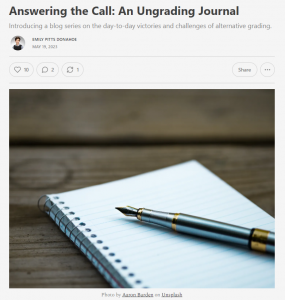by Liz Norell, associate director of instructional support
In late June, the Chronicle of Higher Education’s newsletter on teaching featured Emily Donahoe, associate director of instructional support at CETL, and her experiments with alternative assessment.
In her spring first-year writing course, taught in the Department of Writing and Rhetoric, Emily kept a weekly journal to reflect on her ungrading experiments. She writes that she was inspired to do so by Robert Talbert’s December 2022 blog post challenging other faculty members exploring ungrading methods to do just this.
Talbert argued that so much of the work of retooling assessment practices happens in the dark, which prevents the larger faculty community from benefitting from the quotidian details that the work of teaching and assessing requires. “You have more than enough material for a weekly update. Keep it short, unpolished, relatively unfiltered, and real. That’s what the rest of the world is all waiting for,” Talbert wrote.
To this challenge, Emily said, “I’m in!”
Each week this spring, Emily wrote a journal entry about her course and how she and her students were experiencing her ungrading practices. Emily shared with her students that she would be blogging about the course. To allay any concerns they might have around real-time blog posts about their class meetings, though, she thought it was important to embargo her thoughts until the class ended.
That means the rest of us are watching a semester-long course unfold four months delayed on Emily’s Substack, Unmaking the Grade. By no means, though, does this diminish the gripping nature of Emily’s students’ experiences.
 What’s perhaps most refreshing—and most unusual in academia—is Emily’s willingness to be transparent about her own odyssey of reactions and emotions throughout the process. For example, in week four the students co-created assessment rubrics for the two options she’d given them for their first writing assignment. The iterative class dialogue yielded two rubrics that Emily distilled from class discussions. Emily confesses: “I’m going to be totally, completely honest with y’all right out here on Al Gore’s internet: I hate these things.” She explains that it’s not the idea of a rubric that bothers her:
What’s perhaps most refreshing—and most unusual in academia—is Emily’s willingness to be transparent about her own odyssey of reactions and emotions throughout the process. For example, in week four the students co-created assessment rubrics for the two options she’d given them for their first writing assignment. The iterative class dialogue yielded two rubrics that Emily distilled from class discussions. Emily confesses: “I’m going to be totally, completely honest with y’all right out here on Al Gore’s internet: I hate these things.” She explains that it’s not the idea of a rubric that bothers her:
So, really, we’re back to the tension that gives rise to my ambivalence about rubrics: how can we create clear, specific, and measurable assessment criteria without hampering student creativity, independence, and learning? Still haven’t hit on an approach to this problem that satisfies me.
As I write this, Emily’s series is hitting its midterm stride. Her July 14 post reflects on her experiences so far while her students enjoy their spring breaks. Many of us who have experimented with alternative assessment will find her poignant reflection resonant:
The first is simply a realization about how ungrading is benefiting my students beyond their actual learning. I was thinking about the kinds of grading policies I used in previous writing courses and how my current students would have fared in those courses. It struck me that several of my students, who I know to be capable of doing good work, would have already flunked out of the courses I taught pre-pandemic—some because of absences or late work and some due to the fact that they didn’t fully understand the major assignment guidelines on their first attempt.
…
The notion that struggling students now have a better chance of passing my class is, in many ways, heartening. But it also really bums me out to think about all the students who have lost points, letter grades, or entire semesters of their lives to absences, late work, and a failure to understand assignment requirements. Students who are, in many cases, average or even strong writers! Who can do the work! But who missed an opportunity because of a failure to comply with one course policy or another.
Emily’s reflections are gaining traction in the ungrading community—thanks, in part, to the Chronicle’s newsletter. For instance, her blog got an enthusiastic recommendation from a colleague at the College of DuPage on the Ungrading Hub, a Discord community of alternative assessment-curious faculty hosted by David Buck, professor of English at Howard Community College in Maryland.
Emily credits the strong and supportive teaching culture in the Writing & Rhetoric department for the work she did during the spring semester. Several instructors in the department have used different assessment methods beyond traditional grading systems. The department’s openness to innovation is what Emily says gave her the runway to experiment with, and publicly speak about, alternative grading practices in her own classroom.
For those interested in exploring alternative assessments or other innovations in their UM classes, we invite you to reach out to us to discover how CETL can support your work.
Sign up to get an email whenever we post something new on the blog
